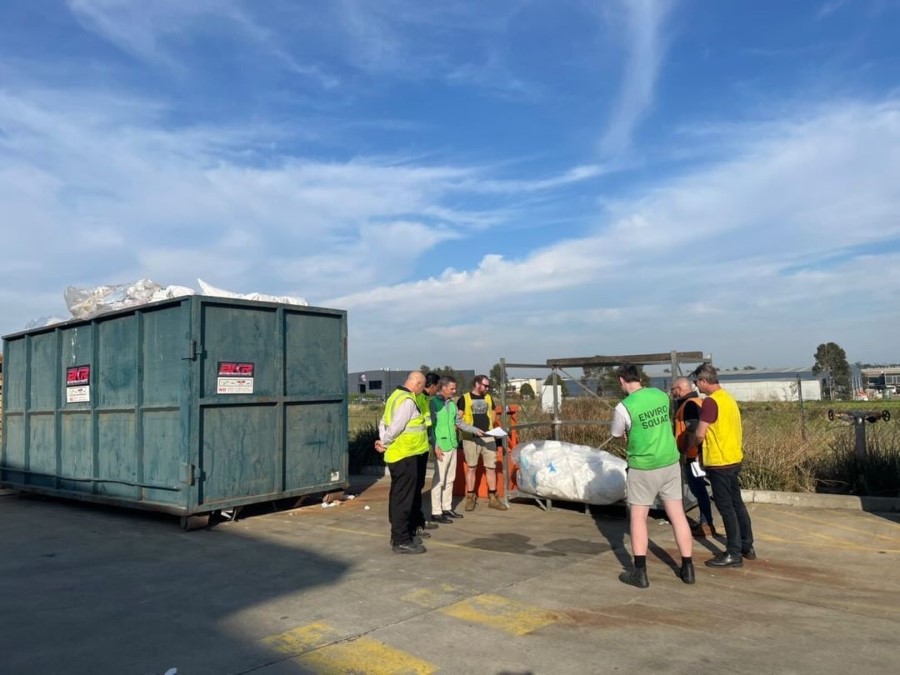
Every Thursday morning, a group of Sancell employees meet to inspect the contents of the organisation’s main waste bins.
For 15 minutes, “rain, hail or shine”, the group — whose members represent various departments and change from week to week — examine what is being thrown out and discuss how to further reduce the volume of waste.
Their goal? To achieve zero waste to landfill.
Since CEO Doug Parkinson launched ‘In the Bin’ meetings two years ago, protective packaging manufacturer Sancell has achieved impressive gains.
“Our Melbourne team have decreased waste bins from an average of 8.8 bins to just one bin per month, while our Sydney team have reduced their average from nine bins per month to just four,” Mr Parkinson said.
“We have also successfully eliminated all labels from gel pack cartons across our Melbourne and Sydney facilities and saved 1203kgs of waste to landfill per year.
“Not only are we sending less waste to landfill, but we are also sending less to external recyclers. Essentially, we are producing less waste and recycling more in-house.”
Mr Parkinson, who attends and runs every ‘In the Bin’ meeting, launched the initiative as a tangible way to motivate employees.
“We said: ‘What can be done that can be measured — that we can touch and feel?’,” Mr Parkinson said.
In 2020, the goal was to reduce waste to landfill by 25%.
Instead — by changing even the smallest processes — Sancell reduced the volume by 89%.
Eliminating laminated labels (with wax backings) and printing directly on boxes is an example of such changes.
“That’s where the financial benefits have kicked in,” Mr Parkinson said.
“The physical material alone was about $19,000 a year but on top of that, it saved our operators about 15 to 20 mins per shift in not having to print the labels.
“The way we look at the ‘In the Bin’ meeting has become very holistic. It’s gone beyond waste to landfill.”
Mr Parkinson’s enthusiasm and commitment are contagious.
“Now that we’ve got staff aware, they will frequently offer suggestions on how we can do better,” he said.
“We had a woman start with us six weeks ago and I got her involved very quickly. Now she sees me every couple of days and asks: ‘Why do we do it that way; why can’t we do it this way?’”
The focus on zero waste to landfill is making employees more aware even when they are not at work.
For example, those who use meal delivery services have become increasingly conscious about the volume of packaging involved.
“We’re learning as we go,” Mr Parkinson, who has been working in the plastics industry for 30 years, said.
“Our focus has shaped what we have all learned over the past two years. It’s just about doing and touching and feeling.”
The environment has long been on the minds of those at Sancell.
“In 2005, we launched the first oxo-biodegradable bubble wrap,” Mr Parkinson said.
“That was a trigger point for us. Landfill has always been a problem since people started talking about single-use plastic bags. Because we’re in the plastics game, we have to be aware of it. We can’t sit back and pretend it’s just about cutlery and shopping bags.”
Sancell is constantly looking at ways to reduce waste and encourages customers to do the same.
“About a third of our current waste to landfill comes from one customer, so we are about to change them to a new product,” Mr Parkinson said.
“We will still have the same amount of waste, but it will be recyclable, rather than ending up in landfill or going through our own internal recycling facility.”
In addition, 25% of Sancell’s energy comes from GreenPower (solar or wind) and the organisation plans to increase this.
The company’s maintenance team, who take part in the weekly meetings, are making their own contribution to energy conservation.
A recent audit on compressed air, which drives most of Sancell’s machines, saved the organisation $28,000 when leaks were identified and fixed.
All in all, the incredible efforts of Sancell mean 155 tonnes of waste a year is no longer going to landfill.
“The really important part about that is that everything that is no longer going in the bin is being recycled or reused,” Mr Parkinson said.
“We’re following the National Plastics Plan and sustainability guidelines, and our target of 20 per cent recycled by 2025 has become a part of this conversation.
“’In the Bin’ is the impetus for our conversation. It keeps everybody alert, and we’re always looking for alternatives.
“To get to absolute zero is going to take a long time because there is unavoidable waste, but we are always challenging the term ‘unavoidable’.
“We’ve got some really smart people here and together, we’re doing a good job.”
Sancell has been a member of Ai Group since 2008.
“Sancell has been an Ai Group member for many years and has benefited from support in HR / IR, informative and topical webinars, staff training and legal advice. The COVID-19 pandemic has thrown up many challenges to our business and the regular updates around constant changes to government regulations from Ai Group has been invaluable. It is comforting to have a partner like Ai Group to assist in dealing with the challenges presented by an ever-changing business environment.” — Doug Parkinson, Company Director, Sancell

Wendy Larter is Communications Manager at the Australian Industry Group. She has more than 20 years’ experience as a reporter, features writer, contributor and sub-editor for newspapers and magazines including The Courier-Mail in Brisbane and Metro, the News of the World, The Times and Elle in the UK.